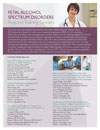Training & Education
Improvements in FASD prevention, identification and care can be enhanced through systematic efforts to educate medical and allied health students and practitioners about these issues. Such efforts will contribute toward the goals of better alcohol screening and care for women at risk for an alcohol-exposed pregnancy and identification, diagnosis, and referral to treatment for individuals with prenatal alcohol exposure.
Parents, caregivers, school staff, and others who are with children with FASDs every day can benefit from learning more about FASDs, how they affect the child, strategies for working with the child to best enable him or her to meet his or her full potential, and how to locate appropriate services for the affected child and his or her family.
CDC is committed to the education and awareness of those who care for and work with individuals living with FASDs. CDC supports the following education activities:
 Enhanced Resources for FASD Prevention and Intervention – NOFAS
Enhanced Resources for FASD Prevention and Intervention – NOFAS
In 2010, the Centers for Disease Control and Prevention (CDC) awarded a 4-year cooperative agreement to the National Organization on Fetal Alcohol Syndrome (NOFAS) . The purpose of this project is to (1) increase the availability and coordination of fetal alcohol spectrum disorders (FASD)-related prevention, intervention, and support services at the national, state, and local levels, and (2) increase awareness regarding FASDs through the distribution and dissemination of accurate information through professional and public health networks and the media. The project, The NOFAS Clearinghouse and Media Outreach Center: A Model of Collaboration, Communication, and Capacity Building, includes the following components:
- A clearinghouse to:
- Enhance and expand the National and State Resource Directory to link communities and professionals with community resources such as diagnosis, family support groups, treatment for women, and treatment for individuals living with an FASD.
- Enhance and expand the NOFAS Information Clearinghouse and disseminate resources and materials.
- Affiliate and stakeholder networks to:
- Engage and grow the NOFAS Affiliate Network and build capacity among network members through technical assistance and through award of microgrants.
- Engage and grow the Friends of NOFAS network.
- Media outreach to:
- Track current media coverage regarding alcohol use and pregnancy and FASDs.
- Develop a process for responding to media portrayals of these issues in a timely manner using consistent messages.
- Develop strategies to engage the media proactively to provide accurate coverage of the topics of alcohol use, pregnancy, and FASDs.
CDC previously collaborated with NOFAS to develop and disseminate FASD prevention and education resources for parents and family members, educators, students, professionals, and the public.
As part of this project, NOFAS developed a school-based K-12 FASD Education and Prevention Curriculum for teachers to implement with students in Kindergarten through grade 12. The curriculum provides age-appropriate information about the consequences that alcohol can have on human development while also encouraging youth to be tolerant and accepting of all individuals regardless of a person's individual capabilities or disabilities.
NOFAS also developed an FASD Public Awareness Guide . The primary purpose of the guide is to enhance public awareness about the risk of prenatal alcohol consumption, FASDs, and the needs of the people and families living with the disorder. The guide offers practical suggestions and strategies to approach community members, service systems, the media, etc. with the FASD prevention and education message, as well as suggestions on how to advocate for services for individuals with FASDs.
 Screening and Intervention Tools for Women's Healthcare Providers
Screening and Intervention Tools for Women's Healthcare Providers
The American College of Obstetricians and Gynecologists (ACOG), in collaboration with CDC, has developed resources for women’s health care providers in identifying women who drink too much and in providing brief educational counseling to reduce or eliminate alcohol use. Resources include a cell phone app, downloadable patient information sheets, current news articles, treatment referral information, and more. These resources are available at no charge to women's health care providers. Learn more!
Educational Materials for the Prevention of Fetal Alcohol Spectrum Disorders in Russia
CDC has collaborated with the University of Oklahoma Health Sciences Center, in collaboration with St. Petersburg State University, to develop (1) training materials for Russian health professionals (pediatricians, obstetricians-gynecologists, substance abuse treatment providers), (2) printed educational materials targeting women of childbearing age in Russia designed to increase their knowledge and change attitudes about alcohol use during pregnancy, and (3) the first web-based FASD education resource in the Russian language to disseminate information to women, health professionals, and the general public. Visit the Russian website on FASDs to access educational materials in the Russian language.
 Educating Families and Professionals
Educating Families and Professionals
In 2001, CDC funded four nonprofit organizations to develop and evaluate educational curricula for various audiences about FASDs and how to access appropriate services for children with FASDs and their families. After being tested through multiple trainings and found to be effective, materials from three of these organizations are still available:
Curriculum for Families and Professionals
The Arc of the United States has developed and tested a comprehensive curriculum for educators to use with families who are raising children with FASDs and for professionals working in school systems, public health service agencies, and social service agencies. Three modules address general information about FASDs, components of care for children with these conditions, and advocating for services and supports. These materials have been tested with more than 1,000 participants, such as parents and caregivers, professionals, and trainers in approximately 20 states.
Triumph through the Challenges of Fetal Alcohol Syndrome: Curriculum for Teachers
Double ARC has developed and tested separate training curricula for parents and teachers. The parent curriculum describes the core deficits of children with FAS and related conditions, teaches effective parenting techniques addressing these deficits, and directs parents to service resources for children, including school programs. The curriculum for teachers describes FAS and related conditions, ways to recognize children who might have the condition, and approaches to enhancing school performance. Double ARC has also created a video on FAS available for use with the curriculum. Double ARC offers training for facilitators who will be teaching the parent classes. These materials have been tested with more than 400 participants in sessions for parents and teachers.
Fetal Alcohol Syndrome Awareness Curriculum for Tribal Justice Systems Personnel
The Preparing a Healthy Path curriculum is designed to inform justice systems personnel about FASDs and to provide them with strategies for responding to persons with FASDs who are involved with the justice system. The curriculum has been tested with more than 400 participants from tribes in California, Idaho, Oregon, and Washington.
Regional Training Centers (RTCs)
CDC funds FASD Regional Training Centers (RTCs). The purpose of these Centers is to develop, implement, and evaluate educational curricula regarding FASD prevention, identification, and care; and incorporate the curricula into the training programs at each grantee's university or college, into other schools throughout their regions, and into the credentialing requirements of professional boards.
The competencies upon which the RTC trainings are based are:
- Demonstrate knowledge of the historical, biomedical, and clinical background of fetal alcohol syndrome (FAS) and other disorders related to prenatal alcohol exposure, known collectively as fetal alcohol spectrum disorders (FASDs).
- Provide services aimed at preventing alcohol-exposed pregnancies in women of childbearing age through screening and brief interventions for alcohol use.
- Apply concepts and models of addiction to women of childbearing age, including those who are pregnant, to provide appropriate prevention services, referral, and case management.
- Describe the effects of alcohol on the developing embryo and the developing fetus.
- Screen, diagnose, and assess infants, children, adolescents, and adults for FAS and other prenatal alcohol-related disorders.
- Provide long-term case management for persons with FASDs.
- Recognize ethical, legal, and policy issues related to FASDs.
Regional Training Center Flyer
Funded Projects from 2011 to 2014:
Arctic FASD Regional Training Center – based at the University of Alaska Anchorage (Anchorage, Alaska)
Frontier FASD Regional Training Center – based at the University of Nevada Reno (Reno, Nevada)
Great Lakes FASD Regional Training Center – based at the University of Wisconsin (Madison, Wisconsin)
Midwestern FASD Regional Training Center – based at Saint Louis University (St. Louis, Missouri)
Southeastern FASD Regional Training Center – based at Meharry Medical College (Nashville, Tennessee)
Funded Projects from 2008 to 2011:
Arctic FASD Regional Training Center
The Arctic FASD RTC, first funded from 2008 to 2011, is based at the University of Alaska Anchorage (UAA) (Anchorage, Alaska) and serves the state of Alaska. The Arctic FASD RTC works with the Fairbanks and Juneau primary campuses of the university, as well as all remote satellites of UAA and other Alaska universities (including Alaska Pacific University), to reach all medical and allied health audiences in the area. The Arctic FASD RTC seeks to meet three objectives: (1) to increase awareness, knowledge, and behavior change among medical and allied health students and practitioners, sensitive to a rural and cultural context; (2) to develop rurally tailored and culturally competent educational curricula and materials that will lead to increased knowledge, changed behavior, and modified training and licensure guidelines, making FASD highly visible in training programs and health care settings across the region; and (3) to disseminate education and resources throughout the region to reach a maximum number of stakeholders who can help realize the prevention of FASD and reduction of FASD risk behaviors, with sensitivity to rural and frontier realities and an understanding of cultural diversity. The Arctic FASD RTC collaborates with a team of national consultants at the University of Washington in Seattle, Washington; a statewide advisory board; and a group of over 20 community partners. A train-the-trainer model uses 1-hour, 3-hour, 1-day, and 2-day training sessions. Modules are tailored to the audience and incorporate culturally appropriate content. Audio and video, as well as a website and other multimedia methods, are used for distance learning to facilitate working with very isolated communities. Evaluation assesses both process and outcome measures. Visit their website to learn more about the Arctic FASD Regional Training Center and find training materials and resources.
Frontier FASD RTC
The Frontier FASD RTC, first funded from 2008 to 2011, is located at the University of Nevada – Reno within the Center for the Application of Substance Abuse Technologies. This RTC serves seven frontier states: Colorado, Idaho, Montana, Nevada, North Dakota, Utah, and Wyoming. Program activities target nursing and social work students and nursing, social work, and substance abuse professionals in this region. The goals of the Frontier FASD RTC are to provide education and training activities to improve workforce capacity in the prevention and identification of and intervention with FASDs, and to increase the proportion of professionals and pre-service students who achieve core competencies related to FASDs. Training approaches include: (1) a face-to-face, competency-based FASD Curriculum Infusion Package (CIP)-comprising 2 to 3 hours of curriculum content-to be integrated into existing nursing and social work undergraduate and graduate courses at major universities in each of the seven states with the ultimate goal of disseminating the CIP to nursing and social work schools nationwide; (2) a 16-week online academic course for social work and nursing students and professionals, and (3) a 5-week online course for practicing nurses and social workers. The Frontier FASD RTC has also created a program website with an online speakers bureau and technical assistance, maintains an FASD library clearinghouse, and works with tribal colleges in their region. Pre-tests and post-tests of participant knowledge and attitudes regarding FASDs are administered to assess both the FASD CIP and the online courses. Staff also conduct follow-up interviews with CIP instructors to assess the curriculum and measure instructor fidelity to curriculum implementation. Visit their website to learn more about the Frontier FASD RTC and find training materials and resources.
Great Lakes FASD Regional Training Center
The Great Lakes FASD Regional Training Center (GLFRTC), first funded from 2008 to 2011, is based at the University of Wisconsin (Madison, Wisconsin) and serves the seven-state region of Hawaii, Indiana, Michigan, Minnesota, North Carolina, Ohio, and Wisconsin. The GLFRTC works with a variety of medical and allied health professionals and students, including those in the fields of psychology and clinical social work. They offer a cadre of in-person training sessions based on the FASD curriculum, as well as a number of skills-based supplementary modules. These supplementary modules include diagnostic skills for physicians and skills and strategies for health care providers working with families living with FASDs. The GLFRTC uses eLearning tools, as well as an interactive website, to reach providers and students across the Great Lakes region and beyond. This includes hosting online learning modules available for CEUs and CMEs. In addition, the GLFRTC conducts an annual weeklong Training of Trainers (TOT) and certified FASD educator program to train additional educators across the region. The intensive TOT/certificate program prepares trainers to conduct and evaluate education and skills development activities in the areas of prevention, screening, assessment, and treatment. A comprehensive process and outcome evaluation plan, including pre-training and post-training assessment and evaluation, along with follow-up evaluations, assesses change in practice behaviors. Visit their website to learn more about the Great Lakes FASD Regional Training Center and find training materials and resources.
Midwestern FASD RTC
The Midwestern FASD RTC (MRFASTC), first funded in 2002, is based out of Saint Louis University and serves the seven-state region of Arkansas, Iowa, Illinois, Kansas, Missouri, Nebraska, and Oklahoma. Due to the success of the MRFASTC train-the-trainer (TOT) model utilized over the RTC’s initial years, the MRFASTC team has created a streamlined version of this model that has been implemented in the region through the development of seven satellite MRFASTC teams. MRFASTC partners include Saint Louis University, University of Arkansas for Medical Sciences, University of Oklahoma Health Sciences Center, and Nurses for Newborns Foundation. The main goals of this RTC are to: (1) train and provide technical assistance and support for the satellite MRFASTC teams to train additional speakers in their states and to host a training event for academic faculty to incorporate the FASD curriculum into their health professions' curriculum; (2) host regional booster sessions for all current and newly trained speakers; (3) create a media relations toolkit for the new satellite teams; (4) create an online speakers program for all current and new speakers; (5) redesign the MRFASTC website; (6) create an evaluation toolkit for the new satellite teams to be hosted on the MRFASTC website; and (7) host an annual communitywide FASD event as part of a national health observance. Pre-test and post-test evaluation measures assess speakers' perceptions regarding course content; knowledge, skills gained and attitudes modified; application of new knowledge and skills; and the impact of the trainings. Visit their website to learn more about Midwestern FASD RTC and find training materials and resources.
Southeastern FASD Regional Training Center
The Southeastern FASD RTC, first funded in 2002, is based out of Meharry Medical College (Nashville, Tennessee) and serves the nine-state region of Alabama, Florida, Georgia, Kentucky, Louisiana, Mississippi, South Carolina, Tennessee, and Texas with an emphasis on FASD prevention, care, and ethics for minorities and individuals affected by health disparities. The Southeastern FASD RTC uses a train-the-trainer model to provide direct education to students and professionals through training sessions for medical and allied health students, residents, and practitioners, as well as through conducting training sessions in the area of corrections. Evaluation methods include attendance and satisfaction data tracked by specialty, pretests, and posttests of FASD knowledge and attitudes, and follow-up assessments 3 and 6 months post-training to determine their effect on practices related to FASD prevention and intervention. Visit their website to learn more about the Southeastern FASD Regional Training Center and find training materials and resources.
Funded Projects from 2002 to 2008:
 Southeastern U.S. Education Center for the Prevention of Fetal Alcohol Syndrome
Southeastern U.S. Education Center for the Prevention of Fetal Alcohol Syndrome
The Southeastern RTC, in its first cycle of funding, served Alabama, Florida, Georgia, Kentucky, Mississippi, North Carolina, South Carolina, and Tennessee, with an emphasis on FASD prevention, care, and ethics for minorities and individuals affected by health disparities. The center was a collaboration between Meharry Medical College (Nashville, Tennessee), Morehouse School of Medicine (Atlanta, Georgia), and Tennessee State University (Nashville, Tennessee). Training efforts have addressed the concern that while many health practitioners appreciate the importance of prevention and diagnosis for FAS and related conditions, they might feel apprehensive about their skills to assess maternal drinking or its consequences for a child. This contributes to missed recognition of FASDs in children and less optimal management of their health and social needs. At Morehouse School of Medicine, the program has worked closely with the National Center for Primary Care and its network of more than 150 clinics throughout the southeast. Also, via a joint program in Allied Health at Meharry Medical College and Tennessee State University, contacts have been made with the College of Allied Health Deans throughout the region to enhance dissemination of educational materials. In 2008, the Southeastern RTC was funded for a new, three-year cooperative agreement (2008-2011). Visit their website to learn more about the Southeastern U.S. Education Center for the Prevention of Fetal Alcohol Syndrome and find training materials and resources.
Northeastern FASD RTC
The Northeastern RTC, located in the University of Medicine and Dentistry of New Jersey (UMDNJ), has provided FASD-related education in multiple training and practice environments. It is closely associated with the NJ state-funded FAS Diagnostic Centers, one of which is also located in the New Jersey Medical School. This has given the Northeastern RTC direct access to child developmental specialists and pediatricians, allowing for practical assessment of strategies and materials developed as part of the educational network. Within the UMDNJ system, the Northeastern RTC has provided FASD training to all three major campuses and has worked with the affiliated nursing, allied health, and public health schools. The New Jersey Medical School, Department of Pediatrics, has a 'week of FASD' for residents and third-year medical students, in which information has been provided on each core competency and practical case presentation from the affiliated state diagnostic centers are incorporated. Outside of the medical school environment, training has been provided to the New Jersey State Department of Justice personnel and local school districts and hospitals. Relationships and trainings have also been established at the state level with the Department of Human Services, Department of Health, Division of Youth and Family Services, Division of Medical Assistance and Health Services, Maternal Child Health Consortia, and state nurses. The Northeastern RTC is also an important and active member of the New Jersey Governor's Task Force on FAS. The Northeastern RTC received an extension for 2008-2009 to complete project activities. Visit their website to learn more about the Northeastern FASD RTC and find training materials and resources.
Midwestern FASD RTC
MRFASTC, in its first cycle of funding, was a collaboration between the Saint Louis University School of Medicine and College of Health Sciences, the University of Missouri-Columbia Schools of Medicine and Health Professions, and the St. Louis Arc. The approach used by MRFASTC to educate audiences about prenatal alcohol exposure and its effects has included integrating developed material into medical school curricula and offering workshops to health care professionals throughout an eight-state area-Arkansas, Indiana, Illinois, Iowa, Kansas, Missouri, Nebraska, and Oklahoma. In order to train health care professionals, MRFASTC adopted a train-the-trainer model. The team recruited 80 trainers from their region who then held at least two training events in his or her area with local health care professionals or students per year, tailoring the presentation to the particular audience. In 2008, MRFASTC was funded for a new, three-year cooperative agreement (2008-2011). Visit their website to learn more about Midwestern FASD RTC and find training materials and resources.
Western FASD RTC
The primary goal of the Western RTC, based out of the David Geffen School of Medicine at the University of California, Los Angeles (UCLA), was to introduce medical students to the practice of public health and preventive health care by integrating preventive clinical medicine into a basic science curriculum. Given this approach, the Western RTC has integrated educational materials on FASDs into the medical school curriculum at UCLA. The program has included a variety of education experiences, such as use of standardized patient (SP) cases-that is, scenarios in which an actor is carefully coached to accurately and consistently portray a specific patient-to allow students to learn and practice skills in counseling patients to promote positive changes in health behaviors. Using this approach, various SP cases have been developed to teach techniques such as screening for alcohol use and brief intervention (BI) as well as assessing an individual for effects from prenatal alcohol exposure. Visit their website to learn more about the Western FASD RTC and find training materials and resources.
Related Articles
These scientific articles are from 2004 to present.
Training needs of healthcare providers related to Centers for Disease Control and Prevention core competencies for fetal alcohol spectrum disorders
Journal of Population Therapeutics and Clinical Pharmacology; 2010; 17(3); e405-417
Brems C, Boschma-Wynn R, Dewane SL, Edwards AE, Robinson RV
[Read summary]
Fetal Alcohol Spectrum Disorders Competency-Based Curriculum Development Guide for Medical and Allied Health Education and Practice
Centers for Disease Control and Prevention; 2009
FASD Regional Training Centers Curriculum Development Team
[Read Guide]
Integrating Case Topics in Medical School Curriculum to Enhance Multiple Skill Learning: Using Fetal Alcohol Spectrum Disorders as an Exemplary Case
Academic Psychiatry; 2009; 33(2):143-148
Paley B, O'Connor MJ, Baillie SJ, Guiton G, Stuber M.
[Read summary]
Fetal Alcohol Syndrome Related Knowledge Assessment and Comparison in New Jersey Health Professional Groups
Canadian Journal of Clinical Pharmacology; winter 2008; 15(1):e57-65
Brimacombe M, Nayeem A, Adubato S, Zimmerman-Bier B.
[Read summary]
Fetal Alcohol Syndrome Disorder Pilot Media Intervention in New Jersey
Canadian Journal of Clinical Pharmacology; winter 2008; 15(1):e124-31
Awopetu O, Brimacombe M, Cohen D.
[Read summary]
Educating Health Professionals about Fetal Alcohol Spectrum Disorders
American Journal of Health Education; Nov-Dec 2007; 38(6):364-373
FASD Regional Training Centers
[ Read summary]
Knowledge and Attitudes about FAS, FASD, and Alcohol Use During Pregnancy by Occupational Therapists in the Midwest
Journal of Allied Health; 2007; 36(3):e203-220
Rudeen PK, Cook K, Mengel MB, Wedding D, Braddock S, Ohlemiller M.
[No article summary available]
Psychologists' Knowledge and Attitudes about FAS, FASD, and Alcohol Use During Pregnancy
Professional Psychology: Research & Practice; 2007; 38(2):208-213
Wedding D, Kohout J, Mengel MB, Ohlemiller M, Ulione M, Cook K, Rudeen K, Braddock S.
[Read summary]
Pediatricians' Knowledge, Training, and Experience in the Care of Children with Fetal Alcohol Syndrome
Pediatrics; 2006; 118(3):e657-e668
Gahagan S, Sharpe TT, Brimacombe M, Fry-Johnson Y, Levine R, Mengel M, O'Connor M, Paley B, Adubato S, Brenneman G.
[Read summary]
Preventing Alcohol-Exposed Pregnancies
Journal of the American Board of Family Medicine; 2006; 19(5):494-505
Mengel MB, Searight HR, Cook K.
[Read summary]
Midwest Family Physicians' Knowledge and Attitudes about FAS, FASD, and Alcohol Use During Pregnancy
Journal of FAS International; 2006; 4:e7
Mengel MB, Ulione M, Cook K, Rudeen K, Braddock S, Ohlemiller M.
[Read summary]
Weaving in Important Curricular Topics: Using Fetal Alcohol Syndrome as an Integrating Theme in Medical Education
Medical Education;2005; 39:505
Baillie S, Paley B, Guiton G, O'Connor M, Stuber M.
[No article summary available]
Comprehensive Approaches to the Screening, Diagnosis and Prevention of Fetal Alcohol Syndrome in New Jersey
Journal of FAS International; 2005; 3:e4
Brimacombe M, Adubato S, Cohen D, Wilson A, Lamendola M.
[Read summary]
Report from the CDC.Physician and Allied Health Professionals' Training and Fetal Alcohol Syndrome
Journal of Women's Health; 2004; 13(2):133-139
Sharpe TT, Alexander M, Hutcherson J, Floyd RL, Brimacombe M, Levine R, Mengel M, Stuber M.
[Read summary]
Enhancing the Health and Development of Infants and Children
Funded Project
American Academy of Pediatrics
In 2009, CDC funded the American Academy of Pediatrics to implement the Public Health Program to Enhance the Health and Development of Infants and Children (PEHDIC). The overarching goal of this program is to link the physician community at the national, state, and local levels with activities that support health promotion and disease prevention for newborns and infants, child development and health, hearing screening, early identification of children with developmental disabilities, prevention of secondary conditions among children with disabilities, health promotion for children with disabilities, and transition of children with disabilities to adult life. As part of the project, AAP is working with CDC to conduct a variety of activities, including:
- Developing professional education materials to inform pediatricians about the prevention, identification, and treatment of FASDs. This includes developing a PediaLink, online educational course, on FASDs and an FASD reference guide for pediatricians. The PediaLink course, Fetal Alcohol Spectrum Disorders: Identification and Management, emphasizes the importance of the primary care provider in suspecting or identifying FASDs, making proper referrals, and facilitating appropriate health care, education, and community services.
- Disseminating information on FASDs to AAP membership through a variety of newsletters and communication channels, such as AAP OnCall, AAP SmartBriefs, and AAP News.
- Disseminating a fact sheet encouraging pediatricians to consider FASDs when evaluating children with developmental problems, behavioral concerns, or school failure.

Contact Us:
- Centers for Disease Control and Prevention
National Center on Birth Defects and Developmental Disabilities
Division of Birth Defects and Developmental Disabilities
1600 Clifton Road
MS E-86
Atlanta, GA 30333 - 800-CDC-INFO
(800-232-4636)
TTY: (888) 232-6348 - New Hours of Operation
8am-8pm ET/Monday-Friday
Closed Holidays - cdcinfo@cdc.gov




